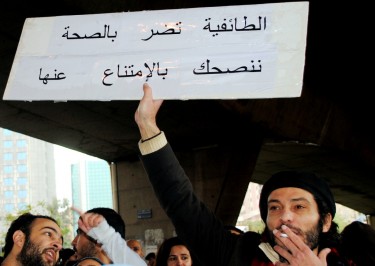“The people want to bring down the regime” is a statement that has been echoing across Arab countries for more than than months. It has reached Lebanon last Sunday with a small amendment: “The people want to bring down the sectarian regime.” More than 2,500 Lebanese citizens marched on February 27, 2011, in the capital Beirut against the sectarian system governing Lebanon and they're planning to march again after tomorrow (March 6).

Smoker holds sign, translation: "Sectarianism is bad for your health. We suggest avoiding it." Beirut, Lebanon. Image by Dana Ballout, copyright Demotix (27/02/11).
The demands of this movement as posted on its Facebook Event are:
نحن مواطنون ومواطنات نتحرك اليوم
- ضد النظام الطائفي ورموزه، أمراء الحرب والطوائف
- ضد نظام المحاصصة والتوريث السياسي
- ضد الإستغلال الإجتماعي – الإقتصادي، والبطالة، والهجرة
- ضد الفقر والتهميش
- ضد الإنماء غير المتوازن والحرمان المناطقي
- ضد العنصريّة والتمييز
لذلك نريد:
- دولة علمانيّة مدنيّة ديمقراطيّة، دولة العدالة الإجتماعيّة والمساواة
- الحق في العيش الكريم لكل المواطنين من خلال:
- رفع الحد الأدنى للأجور
- تخفيض أسعار المواد الأساسيّة
- تخفيض أسعار المحروقات
- تعزيز التعليم الرسمي
- تكافؤ فرص العمل العامة والخاصة
- إلغاء المحسوبيّة، الوساطة، والرشاوى
- الحق بالمسكن اللائق
- تعزيز الضمان الإجتماعي وإقرار ضمان الشيخوخة
هذه هي بعض من ظواهر الفساد في النظام الطائفي القائم، لهذا كله ولأسباب أخرى، يجب ونريد!
إسقاط النظام الطائفيلذا، ندعو جميع المواطنين والمواطنات، وكل أفراد المجتمع الللبناني إلى التحرك.
- Against the sectarian regime and its warlords and leaders
- Against the regime of quotas and political succession
- Against social and economical exploitation, unemployment and migration
- Against poverty
- Against the imbalanced regional development
- Against racism and discrimination
Therefore, we want:
- A democratic, secular and civil country. A country of social justice and equality
- The right of a decent to every citizen through:
- Raising the minimum wage
- The reduction of the basic commodities prices
- The reduction of fuel prices
- Enhancing public educational system
- Providing equal access to public and private employment
- Abolition of patronage, brokerage, and bribes
- The right of proper housing
- Enhancing the Social Security and Old Age Security systems
These forms of corruption are only some of the consequences of the current sectarian regime. And because of that, we want and must bring down the sectarian regime.
Therefore, we call every citizen of the Lebanese community to move.
The protesters were of all ages, genders and religious beliefs and refused to be related to any political party in the country. Here are some of the supporting tweets:
@justimage: Sunni, Shia, Christian, Secular and other, the rain comes down on all the same in #Lebanon. #unitelb
@mdghamloush: انا مني ضد الدين انا ضد الطائفية #feb27 #unitelb
@habibh: All those who are sick of sectarianism, nepotism, corruption, political apathy, please wake up, stand up and demand change NOW! #UniteLB
On the other hand, Fadi didn't like the idea of the protest despite his support of a secular state. He said in his post entitled “Lebanon is Drunk on Revolution Wine“:
I believe no good will come of it.
I've never been a fan of the system in Lebanon. In fact, a secular system is very much what I would hope for, but the best I can say about this uprising is that it is Naive.[…]
Tell me, if the system was changed tomorrow:
- Will the issue of the special tribunal for Lebanon and all the disagreement around it go away ?
– Will the issue of Hizbullah and the conflict with Israel go away ?
– Will the sectarian lines that divide us as a people and make us vote for corrupt politicians within our sect instead of the capable deserving ones go away ?
Mustapha of the Beirut Spring asked “What Next For The Anti-Sectarian Movement?” and said:
As long as they’re using the revolution model and talking of things like “breaking the barrier of fear”, they won’t get anywhere. Because behind that thinking is the false assumption that the majority of the Lebanese are eager to “take down the sectarian order” for whatever that means.
He added:
If I were sitting with them, I would have advised them to focus all their energy on individual issues like civil marriage and the rights of Lebanese mothers to pass their nationality. These issues have a wider base of support among the Lebanese and can be pointed at as concrete achievements to give momentum to future action.
Word is spreading about a weekly protest until their demands are met. Moreover, independent Lebanese youth have already started two open-ended sit ins in Sanaye’-Beirut and the southern city Saida for the same cause this week.
Between the next anti-sectarian regime protest after tomorrow and a March 14 protest on the following Sunday calling for an end of Hezbollah's armament, what do the Lebanese people really want?
Stay tuned to the hashtag #UniteLB on Twitter for more insights and reactions, for it has now become a portal to different Lebanese voices and opinions on how we can have a United Lebanon.







1 comment